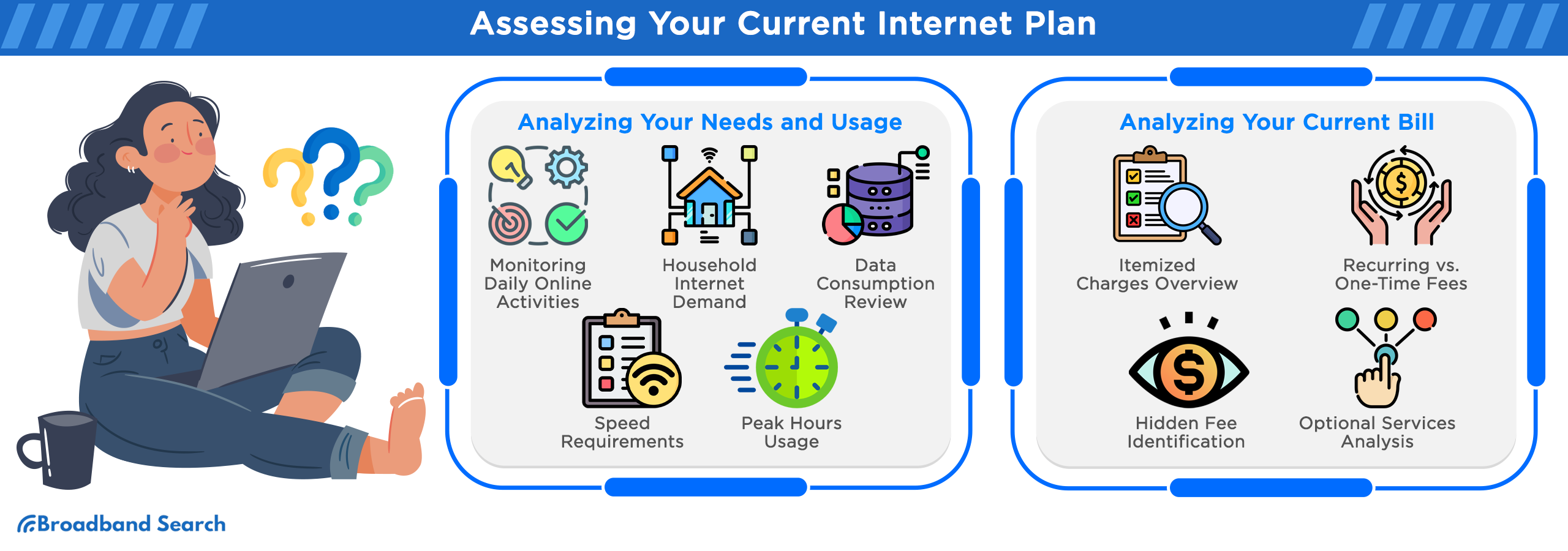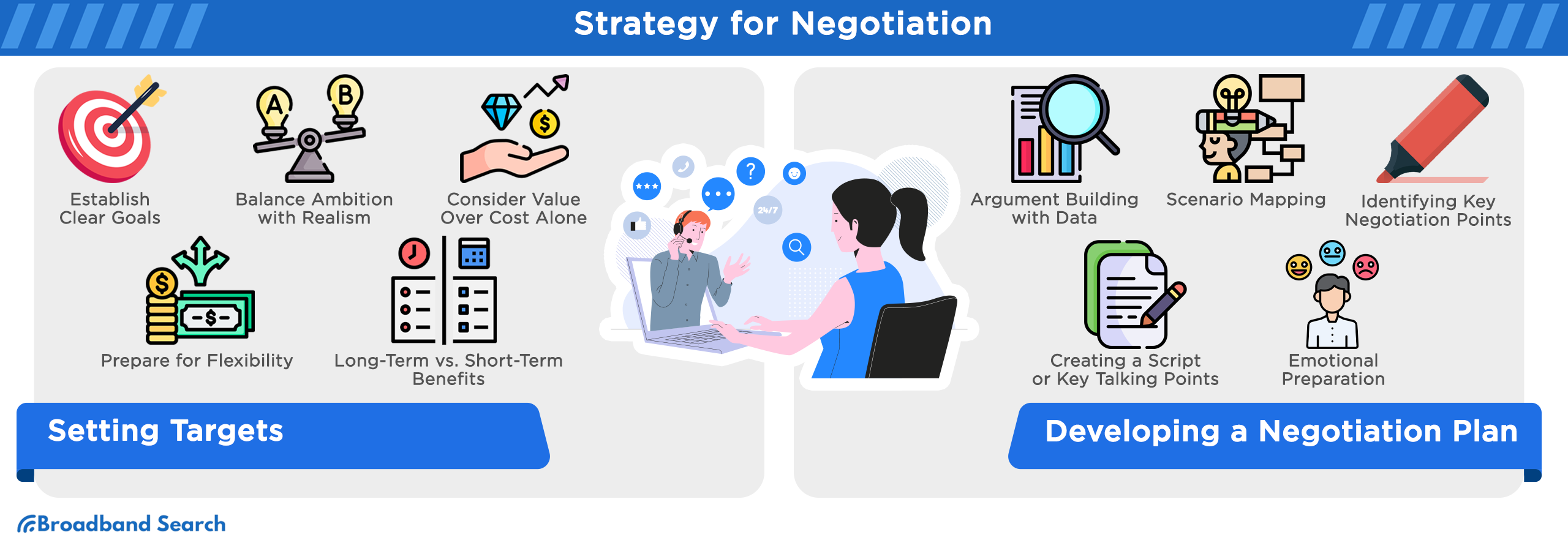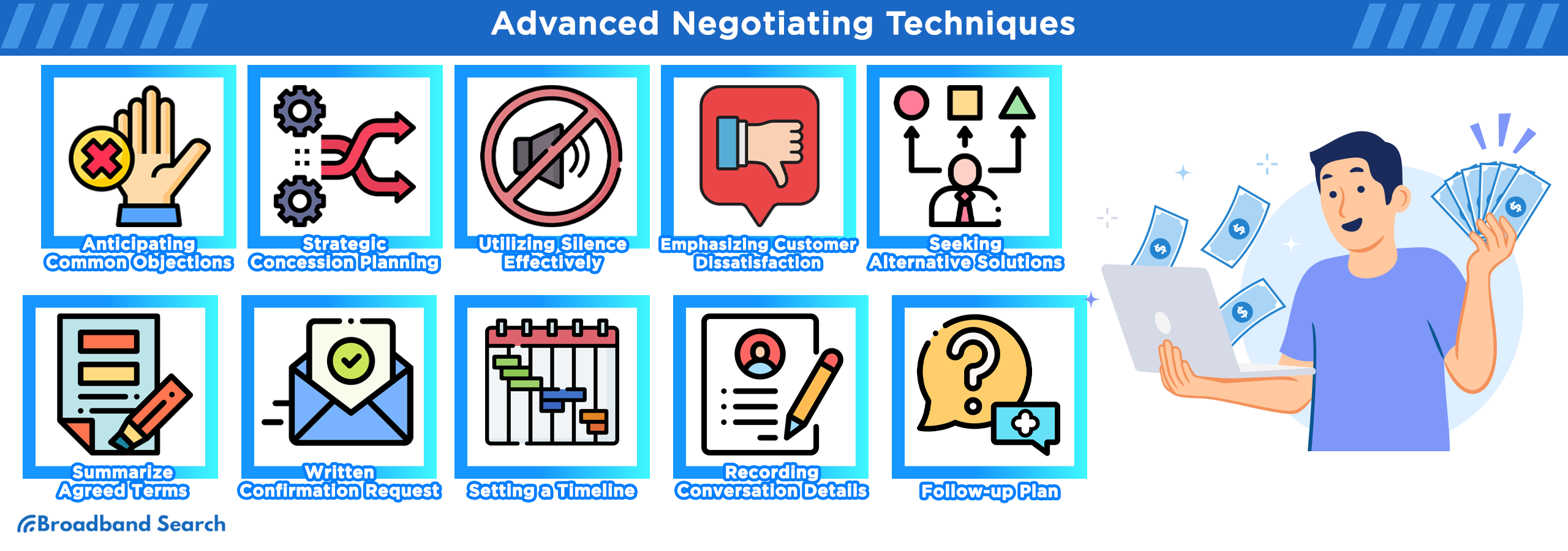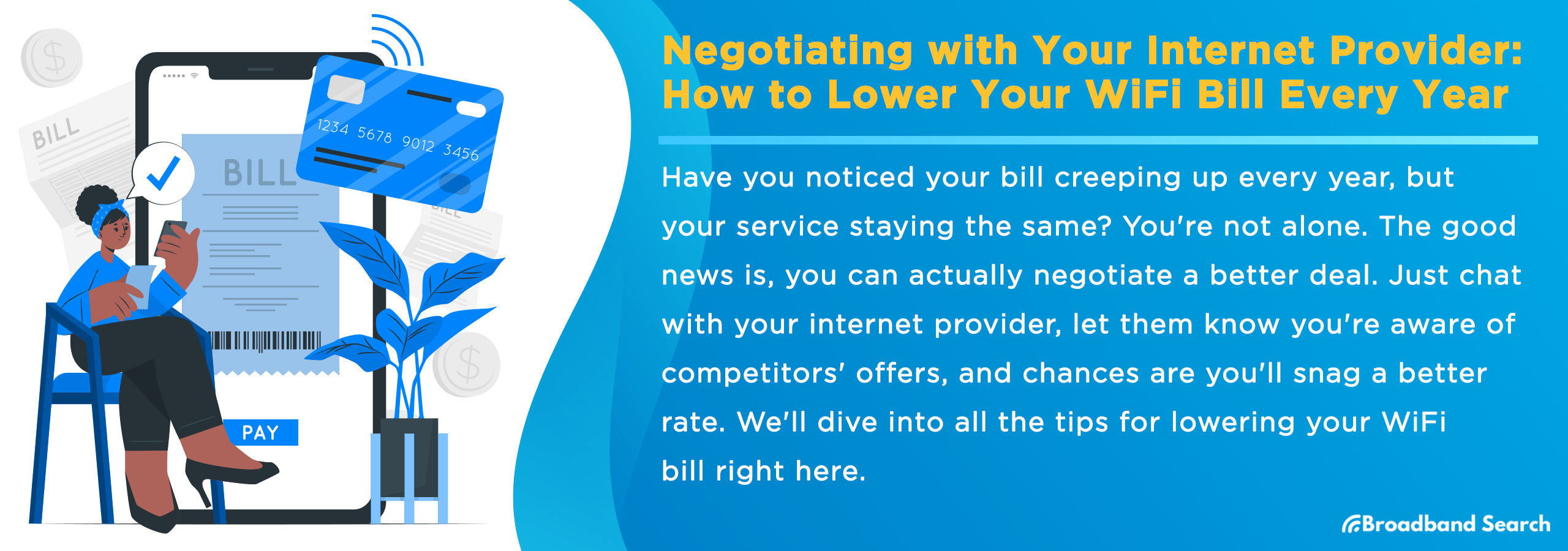Has your bill kept increasing each year, inching its way up with the steady persistence of a climbing vine? You're not alone. Many people find their bills going up without their service improving. While you might think this trend is an accepted norm, there’s the chance of negotiating a better deal.
It does require some market knowledge, but by initiating the conversation and telling your ISP that you know about competitors' offers, you can likely get a better rate for your internet. How? We will talk about everything related to lowering your WiFi bill here.
Understanding Your Bill
Scrutinizing your bill’s line items can sometimes feel like decoding a cipher. Yet, from the fundamental base fee to the fluctuating taxes, understanding these components is crucial for ensuring that you're only paying for what you've agreed to and eventually negotiating a better deal.
Components and Variations
You must know about the following to know your bill and spot potential problems.
- Breakdown of Charges: Your bill typically starts with a base fee for service. On top of this, there are equipment rentals for modems and routers, applicable taxes, and any additional service charges.
- Understanding Rate Fluctuations: Your bill might change based on factors like the conclusion of promotional periods, adjustments in taxes and fees due to policy changes, or supplementary charges from extra services such as pay-per-view events.
- Regular vs. Irregular Additions: Your internet bill is a composite of recurring charges you can anticipate month-over-month. However, it can also feature irregular additions — one-off costs from late payment penalties to setup fees for newly added services. These are not standard and should be scrutinized for validity, as they can occasionally be disputed or even waived.
Why Bills Change
Your internet bill each month might fluctuate for the following reasons:
- Promotional Period Expirations: Many ISPs attract new customers with promotional rates. Standard rates kick in once this honeymoon phase expires, and your bill can significantly jump.
- Adjustments in Taxes and Fees: Your bill is subject to the ebb and flow of government-imposed taxes and regulatory fees, which can vary based on policy changes at local, state, or federal levels.
- Usage-Based Charges: Going over the allotted amount for plans with data caps can incur additional charges. Likewise, utilizing pay-per-view services or on-demand content can add to the cost.
- Annual Price Adjustments: ISPs may have clauses allowing annual price adjustments. These are often justified by the provider as necessary to accommodate for inflation, the rising cost of network maintenance, or enhancements in service quality.
Assessing Your Current Internet Plan
Before you attempt to alter your internet plan or negotiate a better deal, you need to know what you need and want in terms of service. It’s hard to negotiate if you don’t know what to ask for.

Analyzing Your Needs and Usage
To align your internet plan with your requirements, you must look at your household’s internet habits. This critical step helps you avoid overpaying for superfluous services or suffering from insufficient bandwidth that hampers your online experience.
- Monitoring Daily Online Activities: Start by cataloging your regular online activities. Are you a frequent video streamer or an avid online gamer? Perhaps your work requires substantial cloud interaction, or you enjoy browsing and social media. Understanding these habits is crucial in determining the bandwidth that comfortably supports your lifestyle without paying for unnecessary extras.
- Household Internet Demand: Consider the number of devices that connect to your internet simultaneously. Smartphones, tablets, PCs, smart TVs, and various smart home devices can add up quickly, increasing the demand on your internet connection. Evaluate the internet needs of each device to ensure your plan can handle the cumulative load.
- Data Consumption Review: Look at your monthly data usage. If you consistently hit or exceed your data cap, it’s time to consider a plan with a higher data allowance. Conversely, if you never come close to using all your data, you might be able to save by switching to a lower-tier plan.
- Speed Requirements: Assess your required speeds by considering both download and upload demands. If you’re experiencing buffering during streaming or delays in uploading large files, it might indicate it's time for a speed upgrade. Conversely, if everything runs smoothly, you might be overpaying for speed you don't need.
- Peak Hours Usage: Observe your internet’s performance during peak usage times in your household. If multiple family members are streaming, gaming, or working from home simultaneously and your internet is lagging, an upgrade might be necessary to accommodate everyone’s needs without disruption.
Analyzing Your Current Bill
An in-depth review of your current internet bill can reveal a lot about your service that goes beyond the bottom line. Take time to review your bill so you can negotiate away or remove unnecessary costs.
- Itemized Charges Overview: Scrutinize each line item on your bill to understand the specifics behind the charges.
- Recurring vs. One-Time Fees: It's important to differentiate between the charges that appear every billing cycle and those that are one-time, such as installation or activation fees.
- Hidden Fee Identification: Keep an eye out for ambiguous charges that aren't clearly defined. These could be service fees or additional surcharges that weren't prominently disclosed during sign-up.
- Optional Services Analysis: Are you using everything you pay for? Whether it's premium channel packages, additional security features, or equipment upgrades, decide if these add-ons are essential.
Market Research
Learn about your options before negotiating. Being an informed customer can exploit the competitive nature of the Internet service market, leading to more favorable service terms or reduced costs. This step is not merely about finding the cheapest offer; it’s about understanding the full spectrum of services available and picking out the best plan for your household.
Knowing Your Options
Exploring the variety of internet service providers (ISPs) and the plans they offer is a crucial step toward securing a fair deal. This process is not just about pinpointing potential savings but helps you find the best service provider for your needs.
- ISP Landscape Exploration: Investigate all the ISPs servicing your area. Each can offer unique advantages in service, cost, and customer support.
- Plan Comparison: Examine how their plans differ, particularly regarding connectivity speed, data allowances, service uptime, and overall cost.
- Promotional Deals Scrutiny: Keep a keen eye on any introductory offers or bundled service offers. These promotions can significantly cut costs initially but always consider the long-term price to gauge the offer's actual value accurately.
- Long-Term Pricing Strategy: Grasp the complete picture of each plan's cost once introductory rates expire. Some deals may appear attractive upfront but leave you with a nasty surprise in a year.
- Contract Terms and Conditions: Review the fine print regarding contract duration, early termination clauses, and penalties. These factors can be just as influential as the monthly rate.
Industry Trends and Price Benchmarks
To fully understand internet service pricing, you must know about national and local trends. Consider and investigate the following if you have time:
- Regional Pricing Analysis: Start by examining your area's average internet service costs. Are you above the norm? Local market conditions, competition intensity, and regional demand can all influence this figure.
- National vs. Local Provider Trends: Investigate how the service and pricing strategies differ between national ISPs and local providers. National ISPs might benefit from economies of scale, offering lower prices or more services. Conversely, local providers may offer more personalized customer service or niche offerings that better fit your needs.
- Technological Advancements and Their Impact: Keep abreast of how new technologies, like the roll-out of fiber optic networks or the expansion of 5G wireless services, might disrupt pricing structures and service speeds.
- Seasonal and Annual Offer Fluctuations: Pay attention to the timing of new promotions and deals. ISPs often introduce special offers during specific times of the year, such as holiday periods or the start of school seasons, and may adjust pricing or package features at the start of a new fiscal year.
- Regulatory Changes and Effects: Stay informed on government policy shifts and regulatory updates that can impact internet service pricing and availability.
Strategy for Negotiation

Setting Targets
Crafting a roadmap for negotiation with your internet provider starts with precise target setting. Outline your negotiation aims and consider what’s practically attainable. Start with the following:
- Establish Clear Goals: Determine exact figures or desired service level enhancements. This might look like deciding on an exact 15 percent price reduction or a specific bandwidth increase. Having quantifiable goals will provide a solid footing for the negotiation.
- Balance Ambition with Realism: Your negotiation should be fueled by ambition tempered with a dose of reality. Yearning for substantial savings or significant service upgrades is commendable, but consider what is within the realm of possibility from an ISP's perspective.
- Consider Value Over Cost Alone: A lower bill is appealing, but the ultimate objective is enhanced value. This could manifest as more consistent connectivity, access to premium support lines, or additional features that meet your usage needs.
- Prepare for Flexibility: Approach the negotiation table ready to shift your aims. If your ISP can't meet your exact price point, perhaps they can offer other incentives, such as improved equipment or bundled services. Be flexible when possible.
- Long-Term vs. Short-Term Benefits: Don’t trap yourself with short-term gains. Evaluating offers requires a strategic outlook, considering whether a modest increase in your bill could yield long-term satisfaction through significantly better service quality, reliability, or enhanced features.
Developing a Negotiation Plan
Negotiating is more than just calling your ISP and saying, “I want a better rate, please.” It requires a thought-out negotiation plan bolstered by data and strategy. Note the following tools and strategies:
- Argument Building with Data: Do your research. Know your current plan, what other offers are in your area, and your current usage habits. This empirical evidence will serve as the backbone of your negotiation.
- Scenario Mapping: Anticipate what the service representative might say. By pre-empting possible responses from your provider, good or bad, you can more easily adapt to the situation.
- Identifying Key Negotiation Points: Clarify your primary negotiation levers. Establish which aspects of your service you're targeting — price points, contractual flexibility, service enhancements, or ancillary cost waivers.
- Creating a Script or Key Talking Points: Compose a detailed script or list of pivotal talking points to steer the negotiation discourse effectively. This reference will keep you focused on your goals.
- Emotional Preparation: Emotional readiness is a significant facet of negotiation. Brace yourself for the negotiation, readying for possible frustration or pushback.
Effective Negotiation Tactics
Your communication skills are the crux of your negotiation. It's not merely about what you are asking for but how you present your case that can tip the scales in your favor. Entering the conversation with confidence and a clear game plan can transform a routine customer service call into a successful negotiation.
Communicating Effectively
Communicate with clarity and purpose. Effective communication is a multifaceted tool that includes being assertive yet respectful, actively listening, and expressing your needs directly. The goal is to establish a rapport with the service representative and convey your points persuasively.
- Assertiveness in Tone and Language: Adopt an assured and courteous tone. Utilize unequivocal and firm language to articulate your needs and what you anticipate as a fair resolution.
- Active Listening Skills: Active listening is crucial; it ensures you fully comprehend the ISP representative’s stance, situation, and offers. It fosters a respectful dialogue and can often lead to discovering common ground or revealing additional opportunities for agreement.
- Clear and Concise Messaging: Directness is critical. State your case succinctly. Simplicity in messaging is often more compelling and more challenging to refute.
- Phone Negotiation Dynamics: When negotiating over the phone, the subtleties of your voice are your primary tools. Master pauses, emphasis, and tone to convey sincerity and confidence. How you say things can be just as important as what you say.
Leverage Points and Bargaining Power
Identifying and utilizing your leverage points can significantly increase your bargaining power when renegotiating your internet plan. Understand what you bring to the table and what pressures the provider is dealing with. If available, each of these points of leverage should be seen as an opportunity to tilt the balance in your favor.
- Competitor Offers as Leverage: Utilize offers from rival ISPs to showcase the savings or improved services you might access elsewhere.
- Highlighting Customer Loyalty: Your longevity with the provider can be a strong negotiating card. Emphasize your consistent patronage and on-time payments to underline why you deserve special consideration for loyalty discounts or enhanced service terms.
- Usage and Payment Record: A solid record of usage and timely payments underlines your value to the provider.
- Demand and Supply Dynamics: Knowing the provider's market position can inform your negotiation. Understand their current focus—whether that's retaining users or expanding their base—to gauge how flexible they might be with pricing or service adjustments.
- Special Circumstances Appeal: If there are unique factors, such as local service issues or changes in your own circumstances that affect your service needs, these can be leveraged to argue for adjustments in your plan that accommodate these special requirements.
Advanced Negotiating Techniques
Mastering the art of negotiation takes more than just understanding your wants and needs; it involves a deep dive into strategic communication, psychology, and timing. As you approach negotiations with your ISP, employ these advanced techniques to help secure a better deal. This isn’t just about making demands but understanding the negotiation environment involved.

Dealing with Pushback
Confronting resistance skillfully is crucial in negotiations. It involves preparing for objections and understanding the subtle psychological plays that can pivot the conversation in your favor.
- Anticipating Common Objections: Before contacting your ISP, immerse yourself in the service provider's terms and conditions and read up on common objections brought up in other negotiations with that same provider.
- Strategic Concession Planning: Identify beforehand which demands you can afford to let go. Just be sure to focus on your primary objectives.
- Utilizing Silence Effectively: Silence is a tactic as old as negotiation itself. It’s about creating a space for the other party to fill, often with concessions or alternative solutions. Don’t feel compelled to talk.
- Emphasizing Customer Dissatisfaction: Customer satisfaction is the currency of modern business. Professionally expressing your discontent can signal to the service provider that you're at a pivotal decision point, potentially leading them to offer concessions to maintain the relationship.
- Seeking Alternative Solutions: When direct paths to your goals are blocked, think outside the box. Suggest unconventional solutions, showing a collaborative spirit that invites the provider to engage in creative problem-solving.
Closing the Deal
Ensure clarity and get concrete confirmation. When closing the deal, make sure that there is a mutual understanding of the agreement:
- Summarize Agreed Terms: Echoing back the deal to ensure no miscommunication.
- Written Confirmation Request: Ask for a written confirmation of the agreement. It is not just due diligence; it's a necessary step to solidify the verbal agreement. This confirmation is a document that can serve as a reference for future disputes.
- Setting a Timeline: Clearly define when the negotiated terms will come into effect. This minimizes the chance of misunderstandings and gives you a concrete schedule for expected changes.
- Recording the Conversation Details: Documentation is key. Record the representative's name, the call's time, and the agreement's critical points.
- Follow-up Plan: Establish a follow-up mechanism to ensure the service provider has honored the agreement. Ensure that the negotiated terms are not just promised but also enacted.
Post-Negotiation Actions
Once a deal is struck, your work isn't done yet (the work is never over). You need to make sure you get what was agreed upon. Here’s a breakdown of the crucial steps you need to take after the negotiation to safeguard your interests:
Monitoring Your New Plan
After successfully renegotiating your internet service contract, proactive monitoring of your plan ensures that you continue to receive the value and services you bargained for. Vigilance is critical to keeping what you bargained for. Consider the following:
- Billing Verification: Scrutinize the initial post-negotiation bills and ensure everything checks out. Promptly challenge any inconsistency, lest overbilling become a recurring issue.
- Service Quality Tracking: Does your service match the promised speeds and reliability? If not, talk to your ISP.
- Adapting to Usage Changes: As your internet consumption evolves, revisit your plan as needed. Make adjustments if your data consumption changes.
- Awareness of Promotional Expiry: Keep a keen eye on the calendar concerning promotional rates to avoid getting surprised about billing changes and give yourself more leverage when negotiating.
Long-Term Strategies
The landscape of Internet services is ever-changing, and your strategies should evolve accordingly. Use these long-term strategies to help keep your bills low:
- Negotiation Reminders: Create a reminder for yourself well ahead of when a contract or negotiated agreement is about to expire. This will let you negotiate the next term more effectively and keep you off your back foot.
- Loyalty and Alternatives Balance: Regularly reassess your loyalty to your provider against the allure of competitors. This balance is crucial for knowing when to stay put and when to leverage other offers for a better deal.
- Stay Aware of Alternatives: Competition is the lifeblood of keeping costs low. Don’t be afraid to switch providers if there's a better offer. You owe nothing to your ISP outside of your monthly payment. Also, just knowing and mentioning there’s a better deal helps with negotiations.
Final Thoughts
When negotiating with ISPs, come armed with knowledge of the local market, your rights, and your options. The key tactics involve thorough preparation by understanding your current usage and service level, researching competitor offers, and setting clear and realistic targets for negotiation.
Communicate effectively and assertively (though not rudely). Actively listen and stay prepared to manage pushback with strategic concessions and alternative solutions. Close the deal with clarity on agreed terms, written confirmations, and a solid follow-up plan. Do these things, and you’ll be much more likely to find success.
Perseverance is paramount. It’s rarely a one-off event. Instead, it’s an ongoing engagement. Stay proactive. By being diligent, you can ensure you receive the best possible service at the most reasonable price.
FAQ
Is it better to negotiate in person, over the phone, or online?
The optimal negotiation method varies by individual preference and circumstance. In-person negotiation allows for nuanced communication. Phone discussions offer direct engagement. Online correspondence provides ever-important documentation.
How can I ensure that the negotiated terms are honored by my ISP?
To ensure negotiated terms are honored by the ISP, secure a written confirmation and note the agreement's details, including the representative’s name and conversation date. Monitor subsequent bills for accuracy and address discrepancies with the ISP immediately, citing the documented agreement.
How do I handle hidden fees or charges not clearly communicated during negotiation?
To handle hidden fees or charges, contact customer service armed with your negotiation records. If the charges persist, escalate the issue to management or consumer protection agencies, emphasizing the need for transparency and adherence to the agreed terms.
What are the signs that I should consider switching to a different ISP?
Consider switching to a different ISP if you frequently encounter poor service, unresponsive support, and unjustified price hikes. Also, consider switching if your ISP is inflexible in negotiations and a competitor offers a better deal.
How can I use my internet usage patterns as a negotiation point?
Leverage usage patterns to negotiate a plan that fits your needs. A low usage pattern could mean a cheaper plan is in order, while consistently exceeding data caps could justify a higher data plan at a fair rate.

